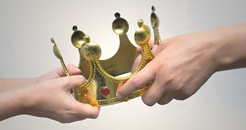 Self-service
Self-service
From an article by Worktalk
Have you noticed how much of human life is driven by power struggles? We all seem to be hardwired to compete, compare and contest, vying for attention, jostling for position, seeking somehow to elevate “my position” over yours. Watch a man and woman in marriage and you’ll often see a tussle for power. Siblings act out rivalry as they try to find places of dominance.
It’s everywhere. Families, tribes, clans, nations, all participating in a relentless, endless global grab for influence, supremacy and blatant power.
Churches are not immune. History is littered with ecclesiastical splits, schisms and squabbles over doctrine, ritual or emphasis.
Then there is the workplace where competition is seen as useful, healthy or even essential. Companies compete for market share, canvassing clients, searching for customers, currying favours in order to survive.
Deep in the human soul there is the desire to be greater than, better than, more successful than whoever the others are.
Then into this world steps the one who calls himself “Son of Man”. Deep in his soul is actual greatness, supreme power and unrivaled knowledge. He could, in a heartbeat, destroy any opposition, eliminate enemies, obliterate any who stood in his path. He could force humiliation and compliance.
It is impossible to understand a person with such innate, limitless power. If you are prepared to try, in your imagination, to glimpse such a person you would soon realize that his first task would be to learn how to handle it. With such power at his disposal he would have to choose to learn. He would have to be teachable if he would not destroy all in his path.
The Son of Man must first learn and become master of himself. And that is what the Gospel writers, and indeed the whole of the New Testament describes. There is a picture of one emptying himself, becoming obedient, growing, learning, maturing and forming himself into the man who could fulfill his destiny. This is why he could say, “For this reason I was born” as he spoke intimately with his father.
As his mission reaches its climax you’ll find, true to form, his followers squabbling about who is the greatest. Consumed with a competitive spirit, they carry the argument to the meal table. One among the party was not just arguing but about to betray the others, presumably in an attempt to serve his own interests.
So consumed was everyone with their own interests they has forgotten basic, yet profound, human courtesy. Freeze the story (in John’s thirteenth chapter) right there.
Can you see how this lust for power blinds us all to human courtesy? While our mouths are full of competitive words, our feet are full of dust and dirt. Normally, in such settings, a servant would be on hand to clean the road from their feet but there was not one on hand.
It’s a picture of every world you live in. Look at the sectarian behavior in your work, in your group, your organization, your country. Everywhere you look mouths are full of competitive words in a world armed to the teeth while our feet are full of dirt. Sitting around tables we are trying to be masters of the universe while we are not masters of ourselves.
So the Son of Man gets up, takes off his robe, wraps a towel around his waist, pours water into a basin, washes, then dries their feet.
It’s an astonishing act and they are all astonished. Some can’t speak, some speak too much.
Then we reach the “I am” moment. ‘You call me Teacher and Lord and rightly so, for that is what I am’.
He goes on to explain that what he has done is an example for them to follow.
But this example is not just about doing random acts of kindness, or being generally helpful even though it includes that for sure.
Jesus has shown them that as Teacher he has first learned about himself. As Lord, he has first mastered himself. They called him Teacher and Lord because he was before them as a man utterly under control doing what he was born to do.
Now ask yourself these questions. Which is harder, to unleash power randomly, to destroy others and to promote yourself, or to channel that power into intimate, altruistic kindness? Is it harder to step on the feet of others or to bathe them? Is it more challenging to pull people’s feet from under them or help them stand?
The miracle of the Son of Man is in the combination. He has immeasurable power but channels it into care, kindness and courtesy.
He has all authority but invites his friends to follow.
Can I suggest that you call upon him to teach you how to know yourself and master yourself, as he did, so that you can channel your energies into the activity of a servant, as he did?
Wouldn’t every world be different this week if we channeled our energies in this way?
The last words go to the Son of Man “Now that you know these things you’ll be blessed if you do them”.
Retweet about this article:
From an article by Worktalk, 22/10/2019